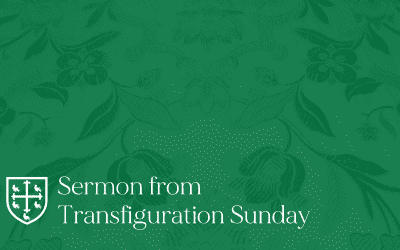3 Lent Year C 3/23/2025
Exodus 3:1-15; Psalm 63:1-8; 1 Corinthians 10:1-13; Luke 13:1-9
Rev. Mark A. Lafler
There are two primary sacraments in the church.
Holy Baptism and Holy Communion.
Both were instituted and commanded by our Lord Jesus Christ.
We hold both as sacred acts where God’s grace comes into our life.
God fills us with His strength…
As the Prayer Book states:
Sacraments are outward and visible signs of inward and spiritual grace, given by Christ.
The sacraments are a treasure of grace to the Church…
A source of strength to the people of God.
In our second reading from 1 Corinthians,
St. Paul mentions these two sacraments…
and establishes them for the people of God finding the truth of baptism and communion…
in the Old Testament.
He finds them foreshadowed in the people of God…
During the time of Moses and the Israelites wandering in the wilderness.
Paul writes:
…our fathers were all under the cloud,
and all passed through the sea,
and all were baptized into Moses in the cloud and in the sea,
and all ate the same spiritual food,
and all drank the same spiritual drink.
For they drank from the spiritual Rock that followed them,
and the Rock was Christ.
You see… sacramental worship is something that God has always had for his people…
(Even way back in the Old Testament) …
because God longs to impart grace into our life…
to impart his favor in our lives.
However, Paul goes on to write:
Nevertheless, with most of them God was not pleased, for they were overthrown in the wilderness.
Just because we have been baptized and because we receive the bread and the wine does not mean we are free to live life however we please.
This is what we call antinomianism…
And it is popular in many forms of American Christianity.
The sacraments are for giving us grace and strength to serve God in this world…
They are not an excuse to keep sinning.
As if God’s laws were null and void because we have received his grace.
Loving God with our heart, soul, strength, and mind includes our behavior…
And in the reading, St. Paul highlights four areas of our behavior…
saying that the Israelites served as examples for us on how NOT to live.
First, do not become idolaters as some of them did.
Idolatry is to replace God with something else.
In the Old Testament it had to do with false gods…
such as the golden calf…
but in modern times it could be anything we replace God with…
money, reputation, family, addictions, progress, the list goes on…
just about anything can take God’s place of worship and time.
Second, we must not indulge in sexual immorality as some of them did.
God cares deeply about human sexuality.
In our world, putting restraints on sexuality is considered unnatural.
Sexuality is celebrated…
to the point of over-saturation in the media world…
it’s right up there with money as the false-gods of our society.
God is not against human sexuality…
he made it… he created it.
But he designed it a certain way…
as described in the Holy Scriptures.
God truly wants us to experience the fullness of God…
and understanding God’s design for human sexuality is part of that.
Third, we must not put Christ to the test as some of them did.
To understand what is meant by testing Christ…
we have to look at the context of what Paul is writing about.
There are two background stories:
In Corinth, Christians were in conflict of whether it was appropriate for some of them to attend the cultic meals in the pagan temples.
The food was offered up to the false gods of Corinth and then would be consumed.
They were compromising their faith by eating at the Lord’s table (on the one hand) and what was called the table of demons (on the other).
In the Old Testament, the Israelites spoke against God and against Moses because they had to eat manna rather than more ordinary food. They were impatient and wanted God to speed things up.
Both stories have to do with living in the world and living at the table of Christ.
To follow the ways of the world with things contrary to Jesus and yet receive at the Lord’s table amounts to testing Christ.
Fourth, do not complain as some of them did.
This one is more straightforward for us…
Our society is full of complaints.
In fact, some people might think complaining is in the bill of rights.
But the kind of complaining Paul is talking about is grumbling…
An attitude of complaint… negativity… always critical…
This is not the attitude the people of God should exude.
So, four things that St. Paul highlights that we should avoid:
Idolatry, Sexual Immorality, Testing Christ, and Complaining.
Our behavior matters to God.
But even with our behavior…
God doesn’t just say, “I hope you make it.”
“Good luck in the world… it’s a tough place…”
He gives us grace.
Here is the good news…
St. Paul wrote it in the last verse of our reading:
God is faithful, and he will not let you be tempted beyond your ability, but with the temptation he will also provide the way of escape,
that you may be able to endure it.
God is faithful.
When we try to not let things take the place of God…
when we resist idolatry.
He is faithful.
When we hold to the standard of God’s word regarding human sexuality… in a world that says God is wrong.
He is faithful.
When we resist testing Christ…
by not compromising our faith.
He is faithful.
When we resist the urge to complain and grumble about what’s happening in the world, in our nation, in our church, in our family,
in our life…
He is faithful.
…he will not let you be tempted beyond your ability…
providing us with a way to endure it.
God is faithful.
It doesn’t say… God is faithful if we are.
It doesn’t say… God is faithful if we live up to our part of the bargain.
It says God is faithful.
He will not let us go through something that is beyond what we can endure.
We might feel like it’s too much…
but God is faithful to see us through.
You see we were born for such a time as this.
God knew we would face the temptations of the world around us.
God knew we would be alive in the month of March in the year 2025.
He is not surprised by what we are going through.
He is not surprised by the struggles we face…
the mountains we must overcome.
He is faithful to see us through it.
There is another person in our readings today that also faced a mountain…
He faced unsurmountable odds…
His name was Moses.
Moses had run away from Egypt after murdering someone…
He became a shepherd and was keeping his flock in the wilderness when he came across this strange sight.
It was a bush… on fire… blazing… but not being consumed.
It wasn’t burning and it wasn’t harmed.
As Moses went to it… God called out to him.
God explains to him how he has heard the suffering cries of Israel in Egypt and has chosen Moses to go to Egypt and free God’s people.
And Moses response to this calling is:
Who am I?
Who am I?
Why me?
That is so often our response too.
Let’s share our faith with the world around us… but who am I?
I can’t do that…
Let’s minister to the outcast… let’s feed the poor…
let’s go on a mission trip…
but who am I? Why me?
I can’t do that I don’t have the words to say…
I can’t do that I’m not faithful enough…
besides I struggle with idolatry, sexual immorality, testing God,
and complaining…
I can’t do that… Who am I?
As Moses considered all of his excuses… God responds with:
I will be with you!
And that is God’s word to us too…
I will be with you.
I am faithful.
Don’t fear the mountain.
Don’t fear the world.
Don’t fear the power of society.
Don’t fear your behavioral downfalls.
I will be with you.
I know you.
I have chosen you for such a time as this.
One of the last things Jesus told his disciples on the night of the last supper… just moments before he was arrested…
and taken away to be tried and executed.
He told his disciples this:
In this world you will have trouble.
But take heart!
I have overcome the world.
(John 16:33)
Church…
We are going to have trouble…
We are going to have struggles…
We are going to have difficulties…
But… The promise of God is this:
He is with us.
God is faithful.
God has given us the grace we need to endure.
And take heart.
Keep your chin up.
Jesus has overcome the world!
Amen.




